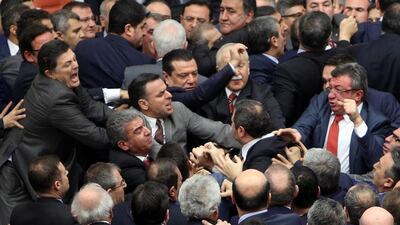ISTANBUL // The Turkish parliament last week began a raucous debate over a controversial draft constitution which would greatly expand the powers of the presidency.
As the opposition attempted to stall the beginning of the debate on Monday with a filibuster, riot police fired tear gas at hundreds of people who had gathered outside the parliament building to protest against the proposed change, which many see as concentrating too much power in the hands of one leader. The sessions since have been tense, with MPs coming to blows at one point mid-week.
In the vision of president Recep Tayyip Erdogan and his ruling Justice and Development party (AKP), the draft constitution containing 18 new measures will transform the president’s largely ceremonial position into one of an executive decision-maker, able to unilaterally declare a state of emergency and appoint and fire ministers. He or she would be immune to prosecution, and able to officially align with a political party.
Mr Erdogan is a co-founder of the AKP, but as president he is currently not allowed to be affiliated with a political party. If this is changed, the president’s party would also be the state’s party, dissolving this political impartiality.
Supporters of the change see the strengthening of the president’s powers as an essential step towards stabilising a country that has been plagued by internal strife, terrorist attacks and regional conflicts that threaten to spill over its borders.
“Stability will be achieved,” said AKP politician Ibrahim Halil Firat, who played a key role in drafting the new constitution. “Decision-making will be quick.”
Under the proposed constitution, the president will be allowed to serve two consecutive five-year terms – so long as he or she wins a simple majority of the vote at each election. Since presidential terms under the previous constitution would not count, Mr Erdogan could be president until 2029 if he wins the next election expected to be held in November 2019. He will potentially wield greater powers than his counterparts in Russia and the United States.
The new constitution is opposed by the largest opposition group, the People’s Republican Party (CHP), whose leader Kemal Kilicdaroglu has said repeatedly that expanding the powers of the president is tantamount to condoning a style of government more akin to a dictatorship.
“They are trying to turn the democratic parliamentary regime into a totalitarian regime,” he said, addressing parliament as the debate began.
Opponents of the new constitution doubt whether the expanded presidential powers – and, potentially, the extended rule of Mr Erdogan – will benefit those not already aligned with the ruling party. They fear it will cement the powers Mr Erdogan has accrued under the state of emergency declared following the attempted coup in July. In the six months since, the repeatedly renewed measure has enabled Mr Erdogan to dismiss more than 100,000 state employees in the name of national security. As a result, state institutions are short of staff, and many citizens are afraid to speak out lest they are framed as sympathisers of Fethullah Gulen, the US-based cleric whose supporters Mr Erdogan blames for the coup attempt.
However, in this particular version of the great debate of freedom versus security, many argue that Turkey is in no position to prioritise the former over the latter, with 60 per cent of the public supporting the proposed constitution, according to a recent poll. Last year, in addition to the coup attempt that killed at 265 people and injured more than 3,000, a total of 10 terrorist attacks killed dozens in Istanbul and Ankara. There were other, smaller attacks in Diyarbakir, Gaziantep and Antalya.
The violence has affected tourism, previously one of the most important sectors of the Turkish economy. Between last January and November, foreign visitors dropped by 30 per cent from the previous year, plunging many areas – particularly resort towns along the Mediterranean and Aegean coasts and historical attractions such as the ancient Anatolian city of Cappadocia – into economic despair.
The Turkish lira has depreciated rapidly, dropping to three to the US dollar in the aftermath of the attempted coup, and slightly further with each attack or political decision taken thereafter. Since the New Year attack by ISIL at the Reina nightclub in Istanbul, the currency’s depreciation has accelerated into a crash, dropping on a daily basis. It is projected to reach as low as four to the US dollar by the end of January, leading many to believe that if the new constitution can stabilise the country, the benefits would outweigh the costs.
So far, it appears – perhaps predictably – that security is winning. Despite the strong opposition of the CHP and People’s Democratic Party (HDP), three of the 18 measures have already been passed. The rest are also expected to win the necessary parliamentary majority of at least 330 out of 550 votes. If approved in parliament, it would then be put to a referendum, allowing the public to have their say as early as the coming spring.
foreign.desk@thenational.ae

